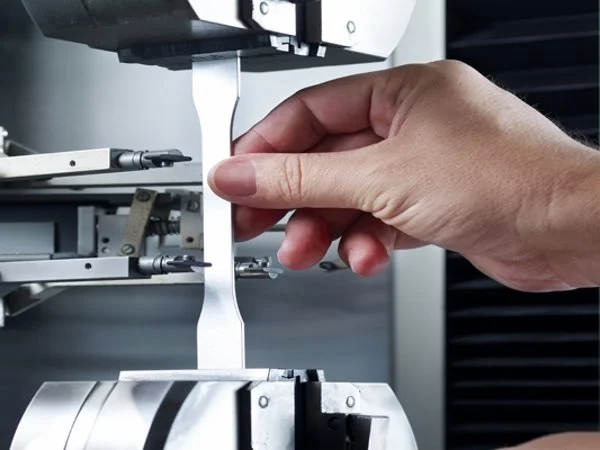NF A03-151 Hardness of Steels Brinell Testing
The NF A03-151 standard specifies the method for determining the hardness of steels using the Brinell test. This method is widely used in various sectors, including oil & gas, automotive, and manufacturing industries where quality assurance is critical.
The Brinell hardness test involves impressing a steel ball indenter onto the surface of the specimen with a specified load for a given time. The diameter of the indentation left on the material's surface determines the hardness value according to the Brinell scale.
For precise and reliable results, NF A03-151 outlines detailed procedures that ensure consistent testing conditions. These include specifying the type of indenter (typically a 10 mm diameter ball), the test force applied, and the duration of the test contact. The standard also provides guidelines on specimen preparation to minimize errors due to surface irregularities or inclusions.
The Brinell hardness test is particularly useful for evaluating the mechanical properties of large parts such as machine components, forgings, and castings. In the oil & gas sector, where materials must withstand extreme conditions, accurate hardness testing ensures that components meet the necessary strength requirements. This method helps prevent failures in critical applications like drill pipes or pipeline fittings.
Understanding the Brinell hardness value is crucial for quality managers and compliance officers as it directly impacts the performance of materials under stress. For R&D engineers, this test provides essential data to optimize material selection and processing techniques. Properly conducted NF A03-151 tests ensure that materials meet industry standards and specifications.
The standard also addresses factors such as temperature effects on the hardness measurement process. It recommends testing at room temperature or under controlled conditions if there is a significant variation from standard temperatures. This precaution ensures accurate results, which are vital for maintaining consistent quality across production batches.
Compliance officers can rely on NF A03-151 to ensure that their materials meet the necessary standards and regulations specific to their industry. By adhering to this method, they not only comply with international norms but also enhance product reliability and customer satisfaction. R&D engineers benefit from detailed insights into material behavior under stress, which is essential for innovation in new products.
In summary, NF A03-151 provides a robust framework for measuring Brinell hardness that supports critical decision-making processes across multiple sectors. Its application ensures that materials used are not only compliant but also optimized for performance and longevity under demanding operational conditions.
Why It Matters
The importance of NF A03-151 Brinell hardness testing cannot be overstated, especially in sectors like oil & gas where material integrity is paramount. Accurate hardness values are essential for ensuring the durability and reliability of components subjected to high-pressure environments.
- Ensures Quality: By adhering to NF A03-151 standards, manufacturers can produce consistent products that meet international quality benchmarks.
- Avoids Failures: Precise hardness measurements help identify weak points in materials before they lead to catastrophic failures. This is particularly crucial for oil & gas equipment where downtime or failure could result in significant financial and safety risks.
Benefits
The NF A03-151 Brinell hardness test offers several benefits that are critical for maintaining high standards of quality and reliability:
- Enhanced Performance: Accurate hardness measurements ensure that materials perform optimally under specified conditions, extending the lifespan of components.
- Certified Compliance: By following NF A03-151 standards, companies can achieve compliance with international regulations and industry-specific requirements.
- Informed Decision-Making: R&D engineers gain valuable insights into material behavior, enabling them to make informed decisions regarding design improvements and process optimizations.
Customer Impact and Satisfaction
The impact of NF A03-151 Brinell hardness testing on customer satisfaction is profound. Consistently high-quality products lead to increased customer trust and loyalty.
- Improved Reliability: Customers receive components that are more reliable, reducing the likelihood of premature failures and associated costs.
- Enhanced Reputation: Compliance with international standards enhances a company's reputation in the market, attracting more customers and partnerships.





